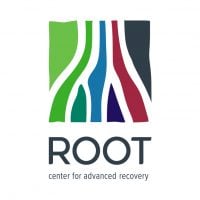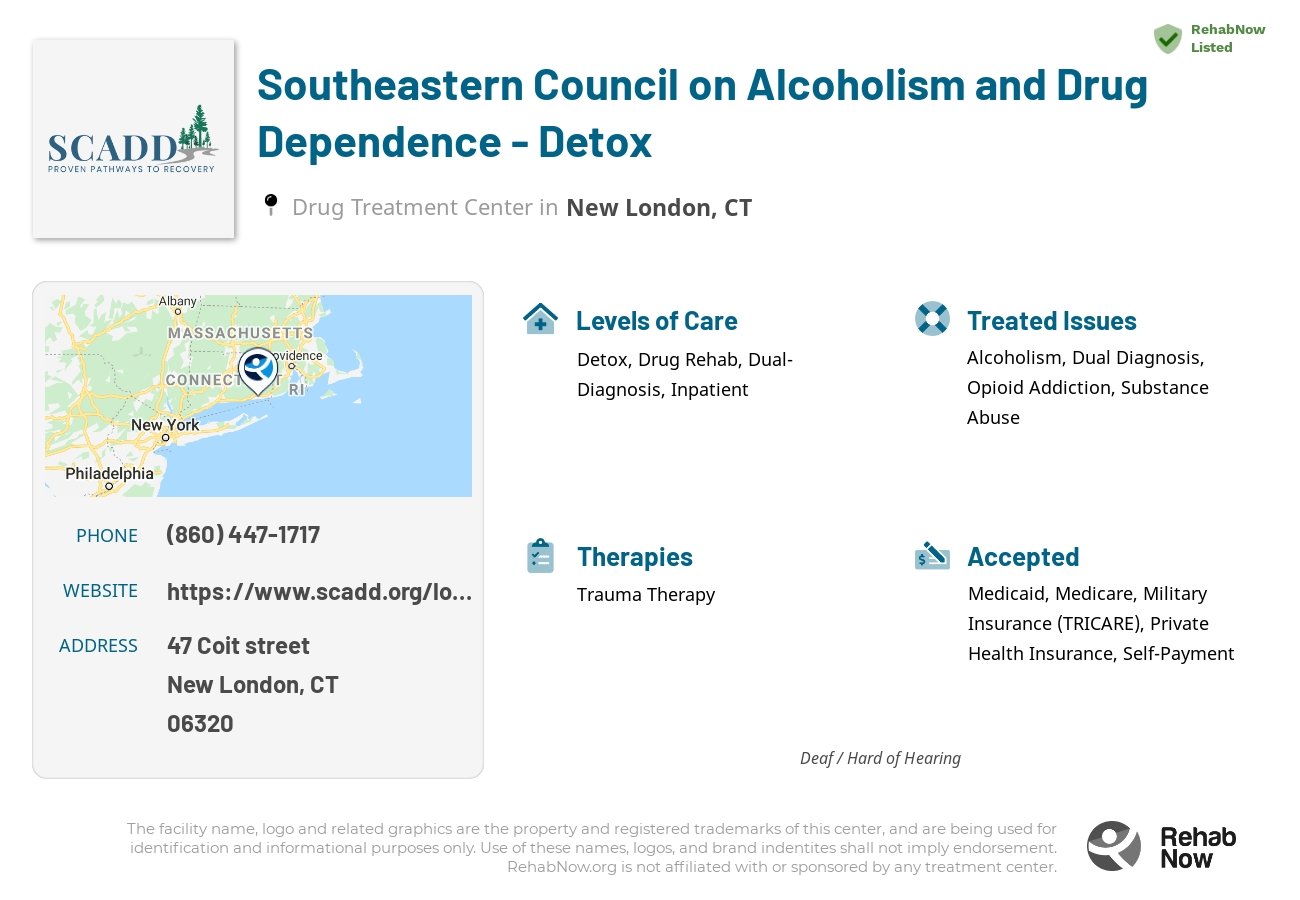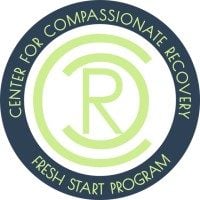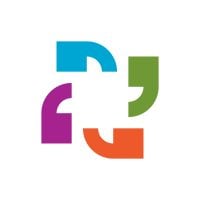
Southeastern Council on Alcoholism and Drug Dependence - Detox
Drug Rehab Center in New London, Connecticut
- Substance Abuse
- Opioid Addiction
- Dual Diagnosis
- Drug Addiction
- Alcoholism
The Southeastern Council on Alcoholism and Drug Dependence in New London, Connecticut offers treatment for alcohol addiction, opioid addiction, substance abuse, dual diagnosis and drug addiction, with three levels of care available and accepted health insurance as form of payment.
About This Connecticut Facility
Southeastern Council on Alcoholism and Drug Dependence - Detox is an addiction treatment facility located in New London, Connecticut. Founded in 1966, this facility is dedicated to helping individuals suffering from alcoholism, opioid addiction, substance abuse, dual diagnosis issues, and drug addiction. They offer various levels of care, including detoxification services and inpatient drug rehab programs. Southeastern Council on Alcoholism and Drug Dependence - Detox accepts private health insurance and is affiliated with SCADD.
Southeastern Council on Alcoholism and Drug Dependence - Detox provides a range of services for those struggling with addiction and substance abuse. Their facility offers detoxification programs to help individuals safely and comfortably withdraw from drugs or alcohol under medical supervision. Additionally, they provide comprehensive drug rehabilitation programs designed to address the physical, emotional, and psychological aspects of addiction. At this facility, clients may receive dual-diagnosis treatment for co-occurring mental health disorders alongside their substance abuse therapy. With their focus on holistic recovery, Southeastern Council on Alcoholism and Drug Dependence - Detox aims to assist individuals in recovering from addiction and building a healthier future.
Genders
Ages
Modality
Additional
Conditions and Issues Treated
Substance Abuse Treatment is important when getting sober, as it helps addicts learn the skills they need to live a clean life. There are many different kinds of recovery treatment, including medication-assisted therapy, behavioral therapeutic approaches and self-help groups, as well as counseling.
Opioid abuse has become a national epidemic in the last decade. The US has one of the world’s highest rates of opioid use and abuse, as well as opioid-related deaths. Opioids are classified as Schedule II-IV controlled substances in the US due to their high potential for abuse.
Oxycodone, hydrocodone, methadone, and fentanyl are the most common Opioids and are commonly prescribed to treat pain. Tolerance to opioids develops over time, making life difficult, if not impossible, without them. Opioid users often obtain the drugs illegally. They can be drug dealers, friends, or family members who do not have valid prescriptions.
The desire for a more intense high than prescription opioids can quickly lead to heroin use. Heroin users are more prone to illness and death due to the high risk of overdose.
Many opioid addicts who seek treatment believe that the only way to overcome their addiction is through medical detox and long-term drug addiction rehab. To help patients wean off their addiction and reduce the risk of overdose, medication-assisted therapy (MAT) involves prescribing a replacement opioid. Doctors use MAT in conjunction with other anti-craving medications to help patients maintain recovery. Due to the high risk of relapse, MAT is often combined with individual and group counseling and social support programs.
When addiction and psychiatric issues co-occur, the addict’s recovery is more successful when both conditions are treated. A dual diagnosis refers to a condition in which the patient is diagnosed with two health issues: addiction and bipolar disorder. The most common therapies are psychotherapy, behavioral therapy, spiritual counseling, 12-step programs, and medication management.
Levels of Care Offered at Southeastern Council on Alcoholism and Drug Dependence - Detox
This center offers a variety of custom treatment tailored to individual recovery. Currently available are Detox, Drug Rehab, Dual-Diagnosis, Inpatient, with additional therapies available as listed below.
The detoxification process typically includes some combination of the following: medical supervision, medication to help alleviate withdrawal symptoms, drug testing to monitor progress, and counseling.
Tackling the physical symptoms of withdrawal is essential to ensure that an individual can focus on the psychological aspects of the addiction without focusing on the physical pain that comes with withdrawal.
Withdrawal symptoms can be uncomfortable, even life-threatening, so carefully managing the detox process is extremely important. In many cases, more advanced pharmaceutical interventions are used to treat more severe withdrawal symptoms. Medication might help alleviate discomfort associated with detox, including nausea and headaches.
Inpatient treatment centers offer a safe, secure, and often medically supervised environment for drug or alcohol-addicted individuals. Many of these facilities are equipped to provide detoxification, treatment for co-occurring mental health disorders, and aftercare programs. The patient typically spends 28 to 30 days at the facility and will receive extensive drug counseling.
Therapies & Programs
Trauma therapy allows people to face and learn from past traumas.
Many people suffer childhood traumas that lead to adult addiction. During treatment at Southeastern Council on Alcoholism and Drug Dependence - Detox [/type], you can move forward in your recovery and reclaim your sober future! Trauma is a common cause of psychological disorders like Addiction Disorder. It’s common in Addictive Disorders patients because traumatized people have strong emotions or thoughts that lead to addictive behaviors.
Payment Options Accepted
For specific insurance or payment methods please contact us.
Is your insurance accepted?
Ask an expert, call (888) 674-0062
SCADD Associated Centers
Discover treatment facilities under the same provider.
- SCADD - Lebanon Pines in Lebanon, CT
- SCADD - Pineview in Lebanon, CT
- SCADD Halfway Houses for Women in New London, CT
- SCADD - Halfway House for Men Norwich in Norwich, CT
- Altruism House for Women in New London, CT
Learn More About SCADD Centers
Additional Details
Specifics, location, and helpful extra information.
New London, Connecticut 6320 Phone Number(860) 447-1717 Meta DetailsUpdated November 25, 2023
Staff Verified
Patient Reviews
There are no reviews yet. Be the first one to write one.
New London, Connecticut Addiction Information
Connecticut has a higher rate of substance abuse and addiction than the national average. The state ranks in the top 10 in the country for illicit drug dependence among those ages 18 to 25. In 2010, there were 9,211 people admitted to an alcohol treatment facility for alcohol abuse combined with a secondary drug. Connecticut ranked fifth in the United States of America for the number of fatalities involving drunk driving in 2014.
The use of drugs and alcohol is a major problem in New London, Connecticut. Since 1999, there have been more than 1,000 drug overdoses in the city. The number of people using marijuana has increased by 50% since 2013. About 15% of drug users in New London are under the age of 18. Some common types of treatment include detoxification, residential, and outpatient treatment.
Treatment in Nearby Cities
- Mansfield Center, CT (29.0 mi.)
- Norwalk, CT (69.9 mi.)
- New Canaan, CT (73.9 mi.)
- Chicopee, CT (61.0 mi.)
- Groton, CT (1.1 mi.)
Centers near Southeastern Council on Alcoholism and Drug Dependence - Detox



The facility name, logo and brand are the property and registered trademarks of Southeastern Council on Alcoholism and Drug Dependence - Detox, and are being used for identification and informational purposes only. Use of these names, logos and brands shall not imply endorsement. RehabNow.org is not affiliated with or sponsored by Southeastern Council on Alcoholism and Drug Dependence - Detox.





